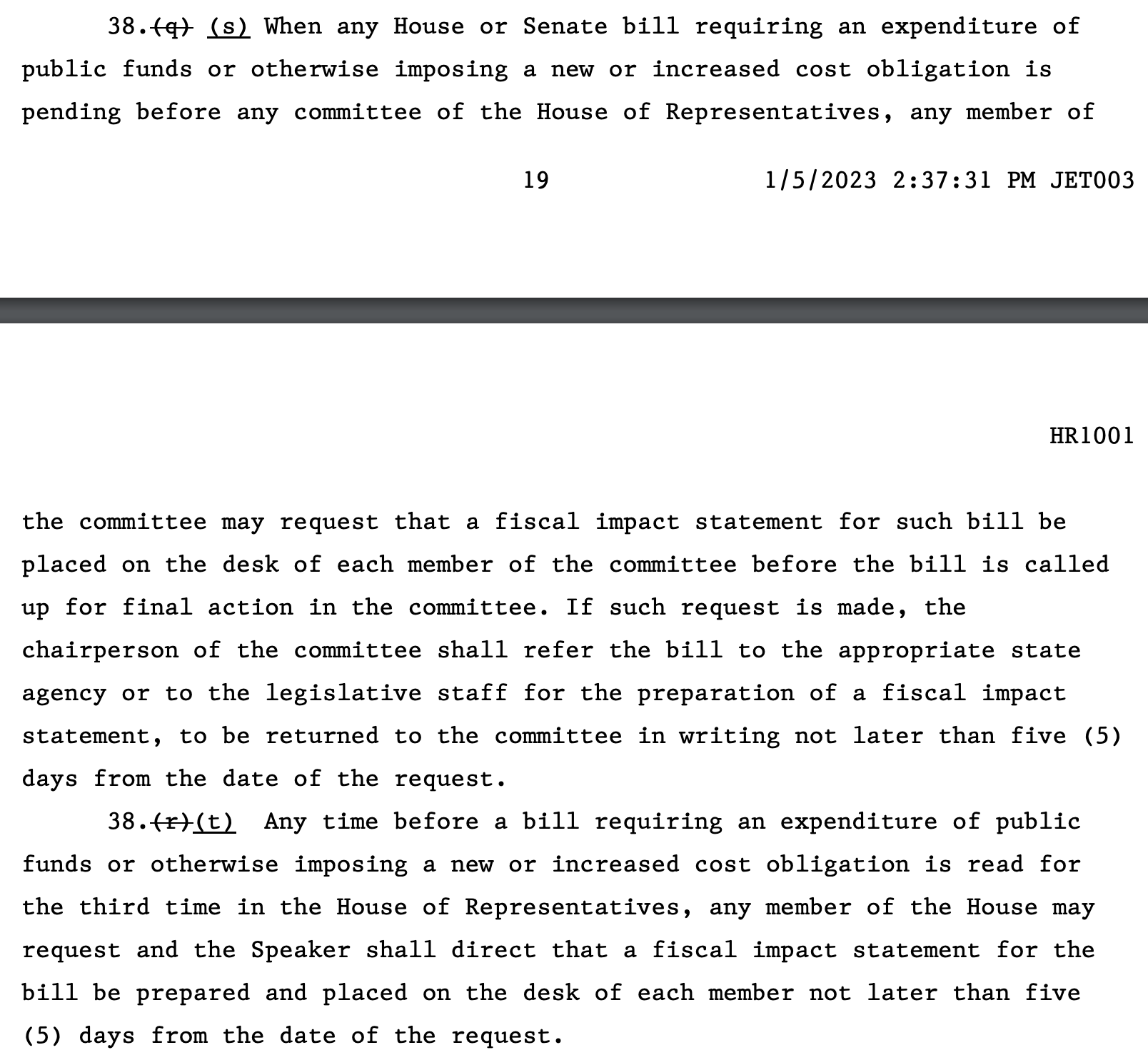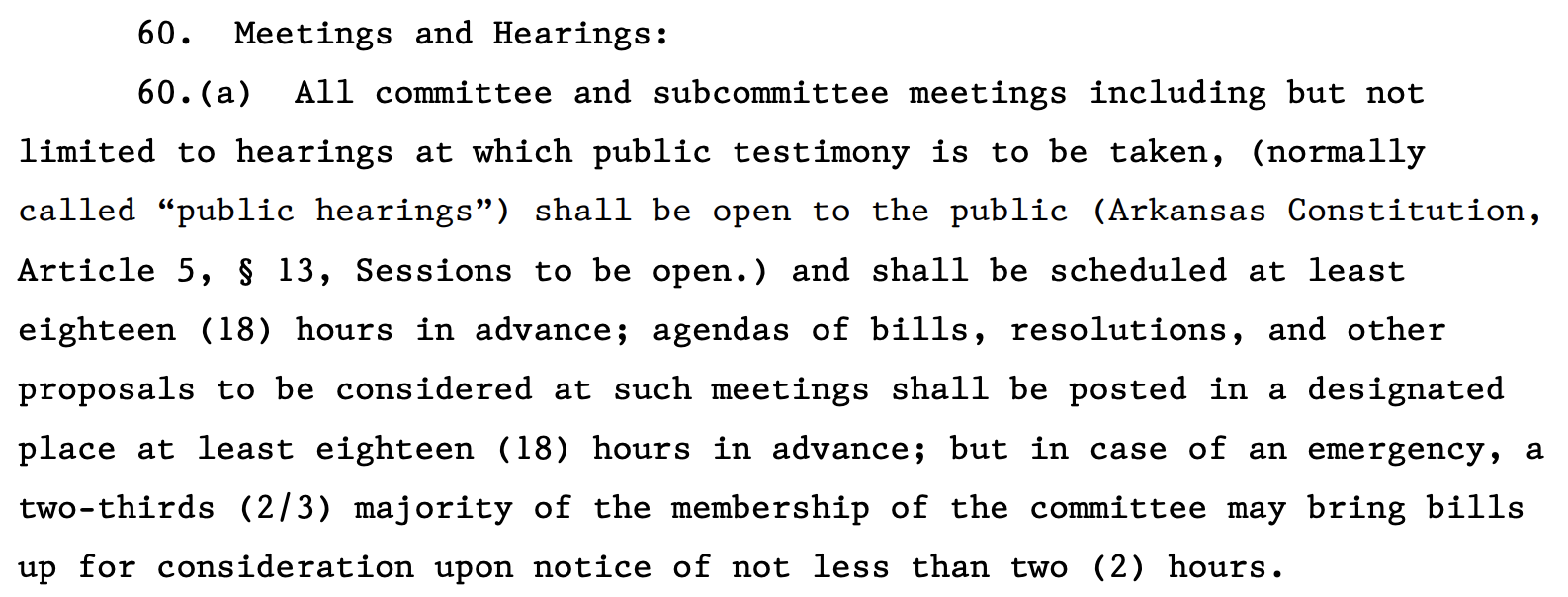Yes, seeing 15 Republicans vote to expand food stamps in the Senate was pretty discouraging, I’ll admit. But this most recent development takes the cake for this session, at least so far.
Late last week, the Arkansas House did something that, frankly, should trouble all of us, Republicans, Democrats, and Independents: they voted to suspend several taxpayer-friendly rules that were in place to protect the public’s ability to give input on legislation and make sure bills don’t get rammed through too quickly without proper vetting.
Here’s the video, so you can see it for yourself:
As you heard in the video, there are three specific rules that were suspended: House Rule 38(p) through 38(t), House Rule 41, and House Rule 60.
What are these rules and why is their waiver significant? Allow me to explain.
THE WAIVED SECTION OF HOUSE RULE 38 ALLOWED MEMBERS TO REQUEST FISCAL IMPACT STATEMENTS
There’s a lot included in House Rule 38(p) through (t), but here’s perhaps the most critical part:

In other words, if legislators want to ask how much money something is going to cost, they have a right to do so. They also have a right to see that statement before they vote.
Well, they did, at least, until these rights were waived.
It’s bad enough that the legislature passes scores of bills without any fiscal impact guesses at all, leaving taxpayers with no idea how much these new proposals are costing. But now the House has apparently decided this information shouldn’t even be able to be requested.
HOUSE RULE 41, NOW WAIVED, GAVE THE PUBLIC AMPLE TIME TO READ BILLS
Here’s what House Rule 41 says:

It seems like the reason for this rule is pretty simple (and good): the public and legislators alike should be given ample time to read proposed legislation before it is voted on.
Why is this rule suddenly no longer needed?
HOUSE RULE 60, BEFORE IT WAS WAIVED, REQUIRED ADVANCE NOTICE OF COMMITTEE HEARINGS
And finally, here’s what House Rule 60(a) says:

This rule, quite obviously, is in place to ensure the public has a chance to be aware of public hearings and make arrangements to attend, if they’d like. Some of them might even like to weigh in on legislation that may affect their daily lives or livelihoods.
Why would this basic right to know about hearings be any less important just because the legislature has decided they’re in a hurry to end the session and get home?
THESE RULES ARE NEEDED RIGHT NOW MORE THAN EVER
In reality, these now-waived rules that protect taxpayers are actually needed at this point during session more than ever. Indeed, this is the time in session when bills start to truly fly through the process. Why would anyone think removing these commonsense protections when they are most needed is a good idea?
In all seriousness, if we don’t need these rules during the last, most chaotic parts of session, why do we need them at all?
If they can simply be waived when they become inconvenient, are they really rules?
If bad-acting special interest groups want to ram through legislation, couldn’t they just wait until this point in session”when it’s a lot more difficult to stop bad bills or for legislators to even fully know what they are being asked to vote on”and then ram their garbage through?
In this week’s edition of (non)Debatable, our weekly insider newsletter, I compared the waiver of these rules to removing locks off the doors of a house for one week a year. But I’ve come up with a better analogy:
It’s more like having your security alarm on 24/7 during the year, but the one time you see a burglar (or in this case, a special interest lobbyist) lurking outside the door, you decide to disable the alarm and let the intruder right in.
Some legislators have been quick to point out, “Well, this rule is often suspended at the end of session.” Their point it seems is that bad behavior, when it happens with regularity, is more excusable.
Which is sort of like saying because theft is occurring with more frequency, it’s somehow alright.
DID THE HOUSE VIOLATE THEIR OWN RULES BY SUSPENDING THEIR RULES?“
I’m not a parliamentary expert, but the reading of this rule seems fairly straightforward to me. It says two-thirds of a quorum is required to suspend the House rules:

But the rules, as you can see in the video, were suspended on a voice vote. How can anyone”the public or otherwise”know with any degree of certainty that two out of three members voted in favor of these motions when there was no head count or recorded vote?
DOESN’T THIS “HAPPEN EVERY SESSION”? AND DOESN’T THAT MAKE IT OK?
Some legislators have voiced to me that the suspension of these time-related rules happen “every session.” The implication is that, for whatever reason, this makes it okay.
I must admit that I don’t fully know the answer to this question; I haven’t gone back and watched the archives from the last few legislative sessions to verify it, although I do recall this happening at times in the past.
But what I do know is that two wrongs never make a right. Ever. This is something I, like many of you, learned at a very young age. No legislative precedent is”on this or any other issue”worth maintaining if it’s bad policy or bad for the people of Arkansas. Heck, if the legislature decides they want to “always” give free lollipops to every Arkansas child born before 2017, that doesn’t mean they should.
Some precedents should be broken. And this is one.
WHERE ALL MY “LEARNS” WATCHDOGS AT?
Remember just a few weeks ago when the collective Left across the state was absolutely melting down about the “speed” at which the LEARNS Act “flew” through the legislature?
Of course they were wrong, as we repeatedly pointed out. That legislation had been in the works for literally years and was debated for close to a month before final passage.
But where are they now? Where’s the media? Where is, frankly, the public outrage? Legislation is now getting filed and passed within a matter of hours. Even if you agree with some of these bills, the process being used should concern all of us.
WE’LL NEVER REDUCE THE SIZE OF GOVERNMENT UNTIL WE FIX OUR BROKEN LEGISLATIVE PROCESS
There’s a lot more to be said about this topic and the broader legislative process, and we plan to say it in the coming months, but one thing is for sure: we are never going to truly solve generational problems in Arkansas until we fix our broken legislative process.
No real bill calendars.
No bill filing limits.
No bill filing deadline (the last two sessions).
No recorded committee votes.
Believe me, I could keep going.
Other states, including those around us who are crushing us economically, don’t operate this way. This system, plain and simple, favors the well-connected and well-financed. It does not favor the people and taxpayers of Arkansas.
Unfortunately, the suspension of these critical House rules are simply the latest reminder of how much work we have left to do.


